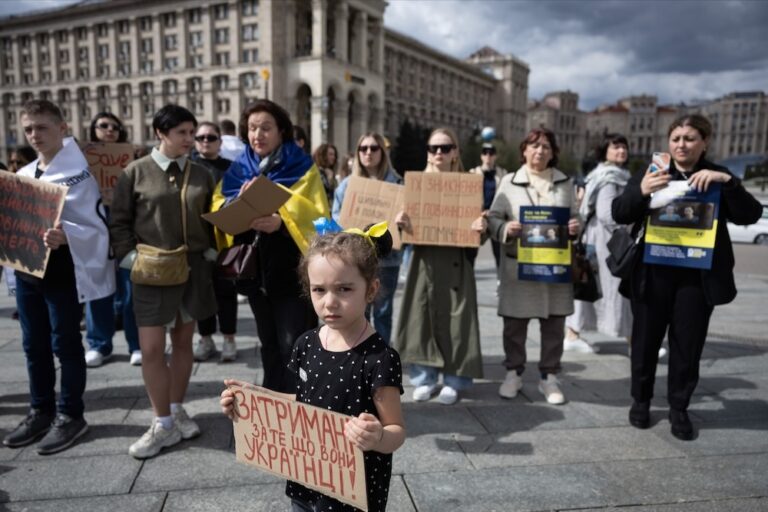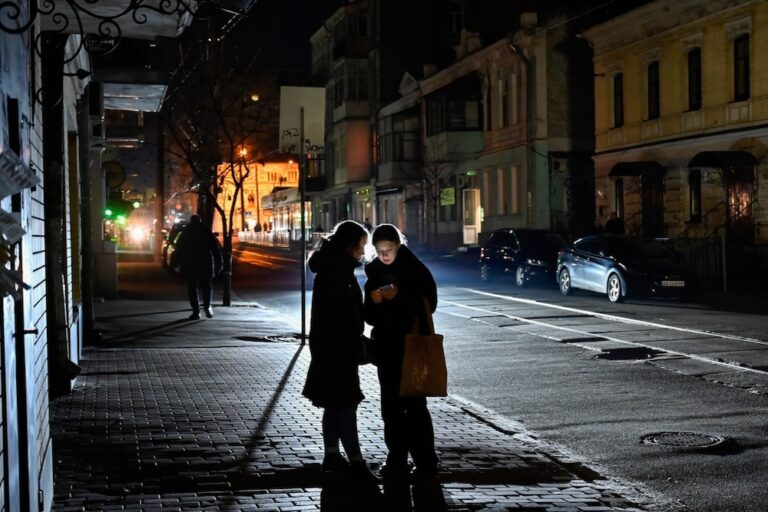“Despite the Kremlin’s repeated pledges to ensure normal working conditions for human rights defenders, Russian civil society groups operate in an increasingly hostile environment,” says Human Rights Watch.
(Human Rights Watch/IFEX) – Moscow, March 27, 2012 – Law enforcement should carry out a prompt and effective investigation into the attempted arson on March 24, 2012, at the office of The Group of Free People in Nizhny Novgorod, Human Rights Watch said today. Russia should hold the perpetrators accountable and put an end to attacks on civil society activists, Human Rights Watch said.
Saturday night, at about 11:30 p.m., the teenage son of the woman who owns the building where the activist group rents an office heard breaking glass. Looking out the window, he saw a tall man in a hooded jacket drop some objects and flee. The landlady ran out and found the office windows broken, a liquid substance on the wooden outside walls, and a strong smell of gasoline.
She found two bottles, one of them broken, next to the building. A puddle of gasoline-like substance was on the ground. She immediately called Stanislav Dmitrievsky, a prominent local activist and a leading member of the group, who contacted the police.
“This arson attempt is clearly aimed at intimidating civil society activists in Nizhny Novgorod,” said Hugh Williamson, Europe and Central Asia director at Human Rights Watch. “Despite the Kremlin’s repeated pledges to ensure normal working conditions for human rights defenders, Russian civil society groups operate in an increasingly hostile environment.”
The Group of Free People is a prominent civil society organization that is active in the local protest movement and hosts regular meetings of the Civil Council, a coalition of local civil society groups engaged in pro-democracy rallies. Dmitrievsky, who runs the group’s core project, International Criminal Justice Online, told Human Rights Watch that the arson attempt was the most serious in a series of incidents targeting The Group of Free People in the past several weeks.
The treatment of civil society activists in Nizhny Novgorod by the authorities has been grounds for concern for several years, with protest rallies brutally dispersed and local activists taken into custody on numerous occasions. In the most recent case, more than 10 pro-democracy activists, including Dmitrievsky, were sentenced to up to nine days of administrative arrest for having participated in a peaceful protest demonstration on March 10 in the city center.
On the night of the apparent attempted arson, after contacting the police, Dmitrievsky and two colleagues went to the office, arriving close to midnight. A police patrol did not arrive until 2:30 a.m., and an investigation team only arrived at 4:30 a.m. When the activists expressed their frustration over the long wait, the officials blamed a shortage of police vehicles for the delay.
“The lack of urgency makes one wonder if the authorities were serious about investigating the attack,” Williamson said.
The police are conducting a preliminary inquiry and have not yet opened a formal file on the case. However, a member of the investigation team told Dmitrievsky privately that the criminal case would most likely be considered an “infliction of material harm” rather than the more serious charge of attempted arson.
The police have failed to investigate incidents at the group’s office earlier in March.
Dmitrievsky said that the landlady told him on March 2 that someone had broken the glass in their office door overnight. Dmitrievsky, who was traveling outside Russia, asked the landlady to report the incident to the police. She did it promptly, but the police never came.
The next morning, on March 3, the landlady saw a leaflet attached to the broken door: “We are letting you know that in the Middle Ages THE PLAGUE was treated by BURNING at the stake!!!!!!!!!!!!!!!!! This place will be saved by the inquisition!!!!!!!!!!!!!” She immediately called the police but again, police officers took no concrete steps in response.
On March 5, during a news conference publicizing the findings of independent monitors for the March 4 presidential election, Dmitrievsky approached Colonel Shmonin, a deputy chief of the Nizhny Novgorod police, showed him the leaflet, and gave him a detailed account of the incidents. In the presence of several broadcast and print journalists, Shmonin promised to carry out a prompt investigation. However, Dmitrievsky told Human Rights Watch, no police officials contacted him or his colleagues to follow up.
Dmitrievsky also told Human Rights Watch that police officials, firefighters, and de-miners with dogs broke up a meeting of the Civil Council in The Group of Free People office at about 6 p.m. on March 22, contending that police had received a call reporting a bomb threat.
Dmitrievsky and his colleagues described the episodes of harassment to the police and suggested that the caller was possibly connected to the people behind those incidents. But the law enforcement officials dismissed this allegation and left an hour and a half later, after inspecting the premises, he said. The Civil Council’s members believe that the bomb scare was intended to intimidate them and disrupt their meeting, Dmitrievsky said.
Russia’s international partners should speak out in support of activists in Nizhny Novgorod and across the Russian Federation, Human Rights Watch said. They should specifically raise with the Russian authorities the need for a prompt, effective investigation into the apparent arson attempt at the office of The Group of Free People.
“The failure of the police authorities to act on previous complaints may have emboldened the attackers,” Williamson said. “The police knew full well that the organization was being targeted and did nothing to stop the threats and attacks.”


